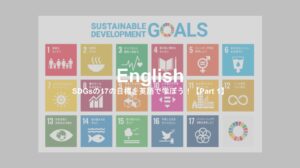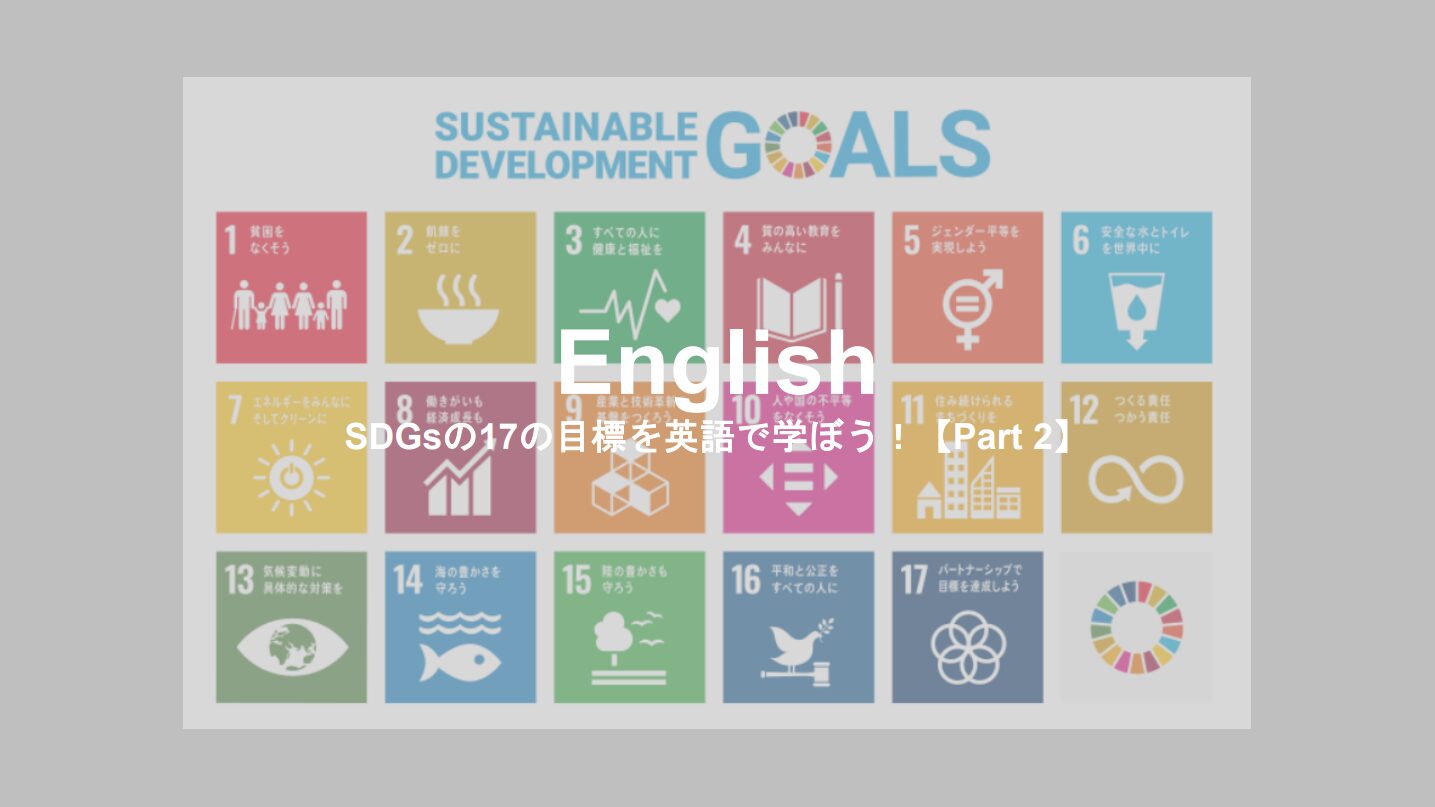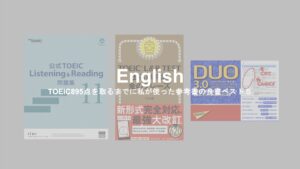SDGsは、持続可能な開発目標(Sustainable Development Goals)の略で、
2015年9月の国連サミットで加盟国の全会一致で採択された、2030年までに持続可能でよりよい世界を目指す国際目標です。17のゴールで構成されています。
皆さんも一度は17のゴールのアイコンを見かけたことがあるのではないでしょうか?
今回は前回のPart 1に引き続き、SDGsの17のゴールを英語と日本語で学んでいきたいと思います。
Goal 1〜5はこちらの記事に載せています。

GOAL 6: CLEAN WATER AND SANITATION(安全な水とトイレを世界中に)

Ensure availability and sustainable management of water and sanitation for all
すべての人々の水と衛生の利用可能性と持続可能な管理を確保する
Facts
Water scarcity affects more than 40% of the world’s population
水不足は世界の人口の40%以上に影響を及ぼしています。
2.2 billion people around the world still lack safely managed drinking water, including 785 million without basic drinking water.
基本的な飲料水がない7億8500万人を含め、世界中の22億人が依然として安全に管理された飲料水を欠いています。
Measurements
Clean, accessible water for all is an essential part of the world we want to live in.
すべての人にとって清潔でアクセス可能な水は、私たちが望んでいる世界において不可欠です。
Let’s take action
Avoid wasting water.
水を無駄にしない。
Key words
sanitation (n) 公衆衛生、availability (n) 利用可能性、scarcity (n) (食料・資源などの)不足、avoid 〜ing (v) 〜しないようにする、waste (v) 無駄に使う
GOAL 7: AFFORDABLE AND CLEAN ENERGY(エネルギーをみんなに、そしてクリーンに)

Ensure access to affordable, reliable, sustainable and modern energy for all
すべての人々の、安価かつ信頼できる持続可能な近代的エネルギーへのアクセスを確保する
Facts
Three billion people still lack clean cooking fuels and technologies
30億人が依然としてクリーンな調理用燃料と技術を欠いています。
789 million people around the world lack access to electricity
世界中の7億8900万人が電気を利用できていません。
Measurements
Energy is central to nearly every major challenge and opportunity.
エネルギーは、ほぼすべての主要な課題と機会の中心にあります。
Let’s take action
Use only energy-efficient appliances and light bulbs
エネルギー効率の高い電化製品と電球のみを使用しましょう
Key words
affordable (adj) 入手可能な、reliable (adj) 信頼できる、fuel (n) 燃料、electricity (n) 電気、energy-efficient (n) エネルギー効率、appliance (n) 電化製品、light bulb (n) 電球
GOAL 8: DECENT WORK AND ECONOMIC GROWTH(働きがいも経済成長も)

Promote sustained, inclusive and sustainable economic growth, full and productive employment and decent work for all
包摂的かつ持続可能な経済成長及びすべての人々の完全かつ生産的な雇用と働きがいのある人間らしい雇用(ディーセント・ワーク)を促進する
Facts
One-fifth of young people are not in education, employment or training.
若者の5分の1は、教育、雇用、訓練を受けていません。
In 2019, 22 percent of the world’s youth were not engaged in either education, employment or training.
2019年には、世界の若者の22%が教育、雇用、訓練のいずれにも従事していませんでした。
Measurements
Sustainable economic growth will require societies to create the conditions that allow people to have quality jobs.
持続可能な経済成長には、人々が質の高い仕事をするための条件を整える社会が必要です。
Let’s take action
Create job opportunities for youth
若者のために雇用機会の創出を。
Key words
decent (adj) 満足できる、inclusive (adj) 包括的な、productive (adj) 生産的な、quality (adj) 質の高い、job opportunity (n) 雇用機会
GOAL 9: INDUSTRY, INNOVATION, AND INFRASTRUCTURE(産業と技術革新の基盤をつくろう)

Build resilient infrastructure, promote inclusive and sustainable industrialization and foster innovation
強靱(レジリエント)なインフラ構築、包摂的かつ持続可能な産業化の促進及びイノベーションの推進を図る
Facts
Roads, water, sanitation and electricity remain scarce in many developing countries.
多くの開発途上国では、道路、水、衛生設備、電気が依然として不足しています。
Just 54% of the global population use the Internet. In the least developed countries only 19% have online access.
世界人口のわずか54%がインターネットを使用しています。後発開発途上国(LDC:Least Developed Country)では、19%だけがオンラインアクセスを持っています。
Measurements
Investments in infrastructure are crucial to achieving sustainable development.
インフラへの投資は、持続可能な開発を達成するために不可欠です。
Let’s take action
Fund projects that provide basic infrastructure.
基盤インフラを提供するプロジェクトに資金提供を。
Key words
resilient (adj) 回復力のある、レジリエントな、industrialization (n) 産業化、foster (v) 促進する、sanitation (n) 衛生、scarce (adj) (食料・仕事などが)不足して、crucial (adj) 必要不可欠の、fund (v) 資金提供する
GOAL 10: REDUCED INEQUALITIES(人や国の不平等をなくそう)

Reduce inequality within and among countries
各国内及び各国間の不平等を是正する
Facts
The poorest 40% of the population earn less than 25% of global income.
人口の最も貧しい40%は、世界の収入の25%未満しか稼いでいません。
Almost 2 in 10 people reported having personally experienced discrimination on at least one of the grounds established by international human rights law.
10人に2人近くが、国際人権法によって確立された理由の少なくとも1つで個人的に差別を経験したと報告しました。
Measurements
To reduce inequalities, policies should be universal in principle, paying attention to the needs of disadvantaged and marginalized populations.
不平等を減らすために、政策は原則として普遍的であり、不利な立場に置かれ、疎外された人々のニーズに注意を払うべきです。
Let’s take action
Support the marginalized and disadvantaged
疎外され不利な立場にある人々を支援しよう
Key words
inequality (n) 不平等、discrimination (n) 差別、universal (adj) 普遍的な、disadvantaged (adj) 不利な立場にある、marginalized (adj) 疎外された
GOAL 11: SUSTAINABLE CITIES AND COMMUNITIES(住み続けられるまちづくりを)

Make cities and human settlements inclusive, safe, resilient and sustainable
包摂的で安全かつ強靱(レジリエント)で持続可能な都市及び人間居住を実現する
Facts
9 in 10 people living in urban areas worldwide were breathing air that did not meet the World Health Organization’s air quality guidelines.
世界中の都市部に住む10人に9人が、世界保健機関の大気質ガイドラインを満たしていない空気を吸い込んでいました。
Measurements
There needs to be a future in which cities provide opportunities for all, with access to basic services, energy, housing, transportation and more.
都市が全ての人に基本的なサービス、エネルギー、住宅、交通機関などへのアクセスの機会を提供する未来が必要です。
Let’s take action
Bike, walk or use public transportation.
自転車、徒歩、または公共交通機関を利用しよう。
Key words
settlement (n) 居住地、resilient (adj) 回復力のある、レジリエントな
Goal 12以降は、「DGGsの17の目標を英語で学ぼう!【Part 3】に続きます。








